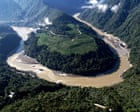
In recent times, significant environmental advancements and challenges have surfaced worldwide, each carrying with them unique implications. From innovative mega-projects in Asia to the escalating impacts of climate change in Europe, the interwoven fabric of human endeavor and nature is more evident than ever.
China has embarked on an ambitious journey to construct what is set to become the world’s largest hydropower dam. This colossal undertaking on the Yarlung Tsangpo River in Tibet is being hailed by China’s premier as the “project of the century.” With an estimated cost of 1.2 trillion yuan, this hydropower project underscores China’s commitment to meeting its energy demands through sustainable and renewable sources. China’s dedication to enhancing its energy infrastructure embodies broader global efforts to transition to cleaner energy sources. While the promise of such a construction is vast, tapping into abundant hydroelectric power, it also raises concerns among downstream nations such as India and Bangladesh. Such countries are contemplating the potential ecological and geopolitical consequences, as the project could affect river flow and water availability in these regions.
Meanwhile, Europe faces its own environmental hurdles as a severe heatwave grips the Mediterranean Sea. This period of elevated sea surface temperatures is becoming increasingly prolonged and intense, a direct reflection of the broader impacts of anthropogenic climate change. Scientists and marine biologists are expressing concern for the region’s marine life. Notably, off the coast of Mallorca, temperatures have frequently exceeded 30°C since late June. This change not only threatens marine biodiversity but also underscores the broader challenges faced by ecosystems under the strain of rising global temperatures. The Mediterranean heatwave serves as a somber reminder of the interconnected nature of global climate systems, where shifts in one region can have profound effects on weather patterns, marine life, and beyond.
The impact of these environmental phenomena is far-reaching, affecting various sectors from energy production to biodiversity. While China’s hydropower project represents a significant stride towards sustainable energy, it also highlights the delicate balance required in managing natural resources responsibly. Similarly, the Mediterranean heatwave brings to the forefront the urgent need for global cooperation in addressing climate change and developing strategies that protect both human and ecological communities. As these stories continue to unfold, they remind us of the importance of considering both the opportunities and responsibilities that come with harnessing our planet’s resources.
In navigating these developments, a mindful approach ensures that nations account for the diverse needs and concerns of all stakeholders, fostering dialogue that prioritizes mutual benefit and environmental stewardship. The pathway forward lies in harnessing innovation, fostering international cooperation, and nurturing a respectful coexistence with the natural world.
Source: {link}
